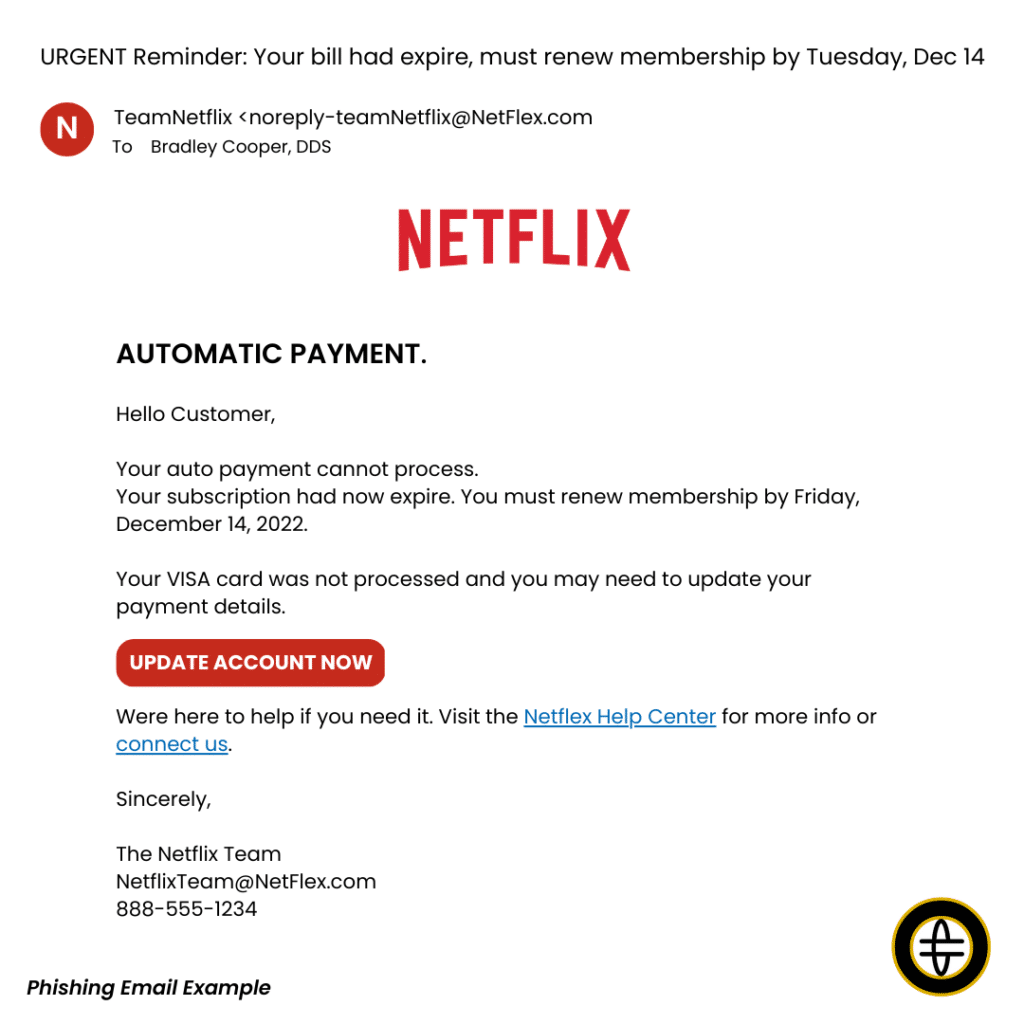With the growth of emerging technologies, such as AI, cybercrime is becoming increasingly sophisticated. These tools are helping hackers become even more undetectable when conducting malicious phishing scams - like email spoofing. As a dental professional, it is of utmost importance for you to understand the basics of recognizing and avoiding these pitfalls - the last thing you would want is for today's patients to be affected by yesterday's mistakes. Recognizing and avoiding phishing scams could help protect everyone involved against costly damage and legal issues due to data breaches.
In this blog post, we will discuss what phishing scams are, why they are so dangerous and provide actionable tips on how to prevent them from affecting your business operations. With a little bit of knowledge and savvy, you can stay ahead of would-be attackers and keep yourself, your data, and your patients safe!
What are Phishing Scams
Phishing scams and attacks are malicious attempts by cybercriminals to gain access to sensitive information such as usernames, passwords, financial records, or other confidential data. These attacks can be conducted through various channels including email spoofing, malware-infected websites, or malicious links sent via text message. Phishing scams typically involve attackers posing as legitimate entities in an effort to trick victims into providing their personal information.
Types of Phishing Scams to Beware Of
Cybercriminals use a variety of tricks to target dental practices, and it is essential that practitioners remain vigilant. Phishing scams are a primary concern and can include:
- Emails with malicious attachments or links to malicious websites
- Fake social media accounts
- Imitation customer service websites
Additionally, spear phishing aims to target particular practice members, such as staff or treatment recipients, to deceive them into releasing secure data. Spear phishing typically includes information known to be of interest to the specific target, such as current events or financial documents. For example, a dental practice office manager may receive an invoice from a vendor (known or unknown) trying to collect payment.

As a dental professional, it is essential for you to remain mindful of phishing scams and attackers as these deceptive activities have become more sophisticated with the rise of AI technology. Most phishing attacks are conducted by criminals who use AI tools to mimic real emails, including those from banks, government agencies, and even social media sites. Failing to properly address incidents or lack of network security can result in serious harm to your dental practice and patients. Accordingly, vigilance and proactive steps should be taken to protect against cybercriminals and phishing attacks. It is essential for protecting against phishing scams and data breaches, which can have profound consequences for dental practices and individuals.
Identifying Signs of a Potential Phishing Attack
It is important for everyone within the dental practice to be on the lookout for potential phishing attacks. These malicious emails, SMS messages, and websites can look convincing when they are crafted by experienced thieves. Luckily, there are some telltale signs that may help identify if a message or website is a scam. Some of these clues include:
- Spelling and grammar mistakes
- Generic salutations like “Dear customer” instead of your name
- Requests for personal info like passwords or credit card numbers
- Any services asking you to provide your financial information
It is recommended to check with the official source before engaging in anything that could put your security at risk. If the source is unknown, it is best to err on the side of caution.
Tips for Avoiding Online Phishing Scams
As hackers increasingly target individuals and businesses through online phishing scams and other cyber threats, it is important to be proactive about network security. A firewall can help keep unwanted traffic off your computer network. When it comes to protecting sensitive patient and practice data, cybersecurity training for employees is also highly recommended; equipping your staff with the knowledge to recognize fraudulent messages or websites is absolutely essential. Finally, implementing a strong network management strategy is key. The following IT solutions should be taken into consideration:
- Business class email over free/generic options: business class email, such as Microsoft 365 Business Email, provides Advanced Threat Protection to protect your dental practice against malware and phishing.
- Firewall: a network security measure that acts as a barrier between your dental network and the internet
- Backup and disaster recovery: this minimizes data loss and downtime through the use of automated backup solutions such as cloud storage or local servers.
- Partnering with a dental IT managed services provider (MSP) who has extensive knowledge in dental software and secure IT solutions. Through extensive network management - regularly updating software and monitoring all devices connected to the network - they can help protect your dental practice against fraudsters. Allowing you to focus on what matters most - your patients.
Repercussions of Falling Victim to a Phishing Scam
Phishing attacks are incredibly dangerous and can have serious repercussions for those who fall victim to them. If the attack is successful, criminals can gain access to sensitive information such as usernames, passwords, Social Security numbers, bank accounts, and your patients’ protected health information. This can lead to financial losses, identity theft and other types of fraud, damage to your network security infrastructure, or violations of HIPAA regulations. Furthermore, if an employee falls victim to a successful phishing attack on their work computer or device, this could compromise the entire practice's cybersecurity protocols and open them up to even more dangerous cyber threats. The financial and legal costs of cleaning up the mess caused by a successful phishing attack can be extremely high; those affected should take immediate steps to secure their data and inform the appropriate authorities of what happened.
Conclusion
Phishing scams are becoming increasingly abundant, but with the right knowledge and resources, you can protect your dental practice and its sensitive information. It is important to become familiar with the warning signs of phishing attacks and be aware of the diverse types that exist today. Vigilance is key to avoiding these malicious attacks, but mistakes still exist—if your dental practice ever falls victim to a phishing attack, it is important to assess damage done and take proactive steps to report the incident as soon as possible. By taking the time to educate yourself and your staff on current policies on online security, you can create a barrier against malicious cybercriminals.
Are you a dental professional in Arizona, California, Nevada, Oregon, or Washington seeking a more secure network for your dental practice? Look no further! Pact-One is here to help you keep your dental practice and patient data secure with multilayered network security solutions that are tailored to your practice. Contact us today for a complimentary consultation.



You must be logged in to post a comment.